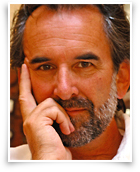
Richard Harvey
connecting psychotherapy and spiritual growth for human awakening
Therapy—A Personal View
Therapy is a word—presently the subject of popular jokes and board games. People involved with it are variously ridiculed by the defensive, “What do you need that for?”—the hidden assumption being “I don’t need it”, or are held in some awe for their involvement.
Perhaps all practices and philosophies that are radically questioning or potentially transformative have been always regarded with suspicion and mistrust and become the brunt of prejudice and ridicule in the same way. For “therapy” is not only a very powerful tool for exploring the inner psyche and emotions. With more people becoming involved with it—taking individual responsibility for their needs and desires, for facing their fears, dealing constructively and safely with their anger and so on—it also implies a radically different world in which we are less prone and vulnerable to “experts”; authority and directives and more self-directed, motivated and sufficient.
But What is Therapy?
In the last forty years there has been a steady building of basic philosophies into a body that has been both a reaction and an extension to the two traditional psychological approaches: psychoanalytic and behavioural. With some crossover and influences from eastern spiritual disciplines and philosophies a new psychology of humanism now emphasise personal experience and the well human being in both physical and emotional, as well as spiritual aspects. Thereby bringing together aspects of human existence previously splintered between doctor, psychiatrist and priest.
Humanistic psychology is a philosophy of well-being, of wholeness. It is a positive reaction to the fears and paranoia engendered by the conclusions drawn by the first psychologists, anxious to attain scientific status installing in us fears about child-rearing, homosexuality, anger etc. It presents a freer outlook in a world now so dominated by the hugely imbalanced distribution of power that the individual is now almost unable to conceive of an autonomous, self-empowered lifestyle free of the effect of tyrannical authority both materially (government, world powers), emotionally (manipulation from family members and commercial advertising) an spiritually.
Such is the larger picture. As a therapist my work tends, and I say this respectfully, towards the mundane: the cauldron of unexpressed emotions, unrequited desires, hopes, needs and fears that each individual brings to the therapeutic encounter is a continual source of fascination and challenge to me, as each person reveals his or her own special life view, and with courage shares it with another in trust and openness.
My own approach includes bodywork derived from Bioenergetics and Neo-Reichian methods, which start from a body-mind position that our bodies are the physical expression of our emotional state. Hence, suppressed feeling cause chronic muscular tensions and result in an inhibited flow of energy, which has many implications for health and disease.
I also use the more verbal methods of Gestalt therapy for increasing awareness, helping to resolve inner conflicts and learning to take responsibility for our actions.
I use many other humanistic approaches—breathing as a way to contact feelings, exploring dreams and relevant myths, guided imagery, regression work to get in touch with suppressed memories and meditation as an awareness technique and to bring us to stillness and deeper truths.
All the personal work that comes out of these approaches takes a lot of integration. A group workshop or a course of private sessions is never the sole ground for growth. Time is needed for change to occur. It is the developing of the client’s awareness and insights between sessions that is the vehicle in which he or she becomes able to bring the fruits of the work out into the world and ultimately transform their lives or aspects of their work.
During this period of work and integration which may span months or years, the client is usually surprised or angry that the world and important figures in his world are unable to see the changes taking place. This is because he is working inside-to-outside. A special intimacy develops between client and therapist as this may be the only relationship in which the inner progress, which is so apparent to the client, is acknowledged.
The approaches of psychotherapy, or indeed of any individual psychotherapist, are rich and varied, as they must be in the attempt to reflect and clarify the manifold processes of human life. I am not able to cover anything like the ground necessary to do justice to the title of this article (hence a personal view).
I hope that as more people open to what therapy can offer them that the prejudice will disappear and the association of sickness and mental illness with the new psychotherapeutic approaches will dissolve. Everyone has the right to explore their potential and regain the freedom once denied them.
Share this article
This article was published in Exeter Flying Post, No 192, in 1989.